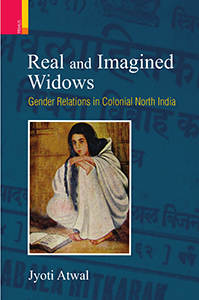
Real and Imagined Widows: Gender Relations in Colonial North India
AUTHOR – Jyoti Atwal
| HB ₹1495 . $69.95 . ₤46.95 |
e-Book ₹1345 . $62.95 . ₤42.95 |
|
INFORMATION
- AUTHOR : Jyoti Atwal
- HB ISBN : 978-93-84082-98-7
- EBOOK ISBN : 978-93-84092-38-2
- HB Year : 2016, EBOOK Year: 2017
- Extent : 294 pp.
- Discount available on checkout
- Usually dispatched within 3 to 5 working days.
Real and Imagined Widows
| HB ₹ 1495 . $ . ₤ |
PB ₹ . $ . ₤ |
|
| POD ₹ . $ . ₤ |
e-Book ₹ . $ . ₤ |
INFORMATION
- AUTHOR – Jyoti Atwal
- ISBN – 978-93-84082-98-7
- Year – 2016
- Extent: 400 + 40 coloured illustrations
- 10% discount + free shipping
- Usually dispatched within 3 to 5 working days.
Real and Imagined Widows: Gender Relations in Colonial North India explores the politico-cultural imagination that formed the subtext of the reformist, nationalist and women’s discourses on widowhood from the colonial period to the 1950s. The reformist voice and action on widowhood remained loosely defined so that the 1933 Bill in favour of giving property ‘rights’ to widows continued to be rejected by conservative Hindus in the United Provinces until 1937, when the debate led by Harbilas Sharda acquired a national status.
This book examines the legislative debates on the relationship between sexuality, morality, property rights and widowhood. The volume also explores the world of literate widows of the early twentieth century, many of whom were also writers. Some of them were conscious of the lacunae in the reformist agenda and developed a unique critique of their own regarding the economic, social and sexual oppression of Hindu widows. Helped by the emergence of a very active Hindi public sphere in the early twentieth century, they could cultivate a literary language of social protest through their autobiographies, poetry, short stories and novels. The complex connection between the nineteenth-century idea of widowhood and the concept of the anti-colonial Mother India of the 1920s transformed the notion of the ideal Hindu widow into a metaphor for a struggling/recovering nation in post-colonial India. In independent India, Nehruvian socialism uniquely combined with Gandhian moral reformism which continued to produce renewed and reformed cultural codes for widows in particular and for Indian women in general.
Located in the intersections of widowhood, patriarchy, colonial jurisprudence, and nationalism, this book will be of lasting pertinence to scholars of not just Modern Indian History but also Gender Studies, Cultural Studies, Literature, and Sociology.
The Author
Jyoti Atwal is Associate Professor in Centre for Historical Studies, Jawaharlal Nehru University, New Delhi.
Real and Imagined Widows: Gender Relations in Colonial North India explores the politico-cultural imagination that formed the subtext of the reformist, nationalist and women’s discourses on widowhood from the colonial period to the 1950s. The reformist voice and action on widowhood remained loosely defined so that the 1933 Bill in favour of giving property ‘rights’ to widows continued to be rejected by conservative Hindus in the United Provinces until 1937, when the debate led by Harbilas Sharda acquired a national status.
This book examines the legislative debates on the relationship between sexuality, morality, property rights and widowhood. The volume also explores the world of literate widows of the early twentieth century, many of whom were also writers. Some of them were conscious of the lacunae in the reformist agenda and developed a unique critique of their own regarding the economic, social and sexual oppression of Hindu widows. Helped by the emergence of a very active Hindi public sphere in the early twentieth century, they could cultivate a literary language of social protest through their autobiographies, poetry, short stories and novels. The complex connection between the nineteenth-century idea of widowhood and the concept of the anti-colonial Mother India of the 1920s transformed the notion of the ideal Hindu widow into a metaphor for a struggling/recovering nation in post-colonial India. In independent India, Nehruvian socialism uniquely combined with Gandhian moral reformism which continued to produce renewed and reformed cultural codes for widows in particular and for Indian women in general.
Located in the intersections of widowhood, patriarchy, colonial jurisprudence, and nationalism, this book will be of lasting pertinence to scholars of not just Modern Indian History but also Gender Studies, Cultural Studies, Literature, and Sociology.
The Author
Jyoti Atwal is Associate Professor in Centre for Historical Studies, Jawaharlal Nehru University, New Delhi.




